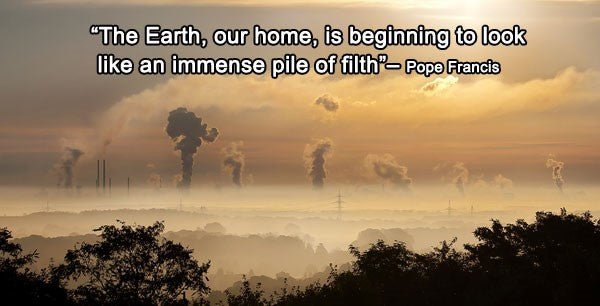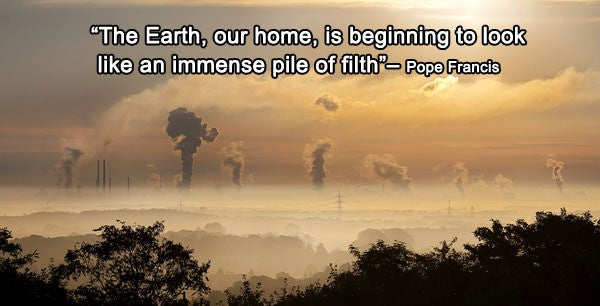
Is It Time for Change? Insights and Reflections
Share
Wednesday, 5th August 2015
Summer is turning out to be a season of watershed moments, isn’t it? First it was Pope Francis’s Encyclical Letter, The Holy See – calling for action on climate change.
It’s a goliath 180-page document calling upon rich nations to pay their “grave social debt”. The encyclical calls for progressive replacement of coal “without delay” even at the expense of turning to gas – which is (in the document) considered the “lesser of the two evils”. International politicians and global summits have produced “regrettably few” solutions to cut carbon emissions according to the Encyclical.

The Pope’s message is that, climate change is real – and that it’s getting worse. What do you think? Do you think climate change is affecting wildlife population?
The second watershed moment was the WWF’s and ZSL’s Living Planet Index® (LPI) report 2014. If you are one of those who has been saying for years that there seems to be fewer mammal, bird, reptile, amphibian and fish species than there used to be now’s your time to say “I told you so!” Vertebrate species have declined by 52 per cent between 1970 and 2010. Expressed in a different way, for every two wild creatures alive on Earth in 1970, only one remains today.
“The LPI, which measures trends in thousands of vertebrate species populations, shows a decline of 52 per cent between 1970 and 2010. In other words, vertebrate species populations across the globe are, on average, about half the size they were 40 years ago.” – WWF/ZSL
The question is, though, how many vertebrate species have we lost during the industrialised world? Not between 1970 and 2010, as that’s just forty years. No. What’s the true picture?
The LPI makes for a fascinating (and scary) read – we apparently need “1.5 Earths to meet the demands we currently make on nature.” If this is correct, it doesn’t take an accountant to work out that we are eating into the planet’s reserves and therefore making it more difficult to sustain the needs of future generations.
Some of the population declines might seem too far away for us to really care. Should geography matter, though? How many more of Cecil the Lion’s pride would need to die for us to become more concerned about illegal hunting? Or was Cecil the tipping point? Away from Lions – if South Africa’s ecosystem is thwarted from providing food and shelter, does it affect us? Shouldn’t we be more concerned about what’s happening here in Britain? It’s impossible to devolve away from the world’s wildlife, as we are all connected. For example, many would consider the Swallow to be a British bird and yet they return to their wintering grounds in South Africa in September and October, only to return to the UK in April and May. On their way to South Africa they travel through France, Spain and then cross the Sahara – which means they are exposed to changing weather patterns. The Swallow is an “amber” concern on The British Trust for Ornithology (BTO) conservation listing – stating that “Analysis has shown that the population fluctuations are most strongly related to variable losses on their wintering grounds (Baillie & Peach 1992). One thing is for sure: birds need us and we need them too!
The third watershed moment was President Obama’s new plan to cut carbon emissions from US Power Plants:

President Obama’s watershed moment, for anyone who’s interested in climate change, is surely his “Clean Power Plan” initiative (launched Monday 3 August). In it he states that, America’s climate is changing and that it’s threatening the American economy. He’s wrong; it’s threatening the world’s economy, security and health; however, he is of course the President of America so we should forgive him for being US centric.
The biggest and most important step The White House has ever made to addressing climate change is already under attack, though. There’s already talk of corporate lawyers, coal lobbyists and Republican politicians unpicking Obama’s work. Were the same brains to get behind the initiative to achieve new carbon emmision targets we can only feel that we'd get there faster. “We can see the climate change, and we can feel it,” says Obama: hotter summers; rising sea levels; extreme weather events, like stronger storms; droughts and a twofold increase in asthma suffers, in just three decades.
Click on the play button below to see Obama’s “Clean Power Plan” video online or visit www.youtube.com/watch?v=uYXyYFzP4Lc
https://www.youtube.com/watch?v=uYXyYFzP4Lc
Here’s what we’re (Haith's) doing to #ActOnClimate.
Please share this with a friend and let us know (below) what you think to these three watershed moments...
Support the wildlife in your garden with clean, safe & nutritious Haith's Bird Diets.
Written by Simon H. King
